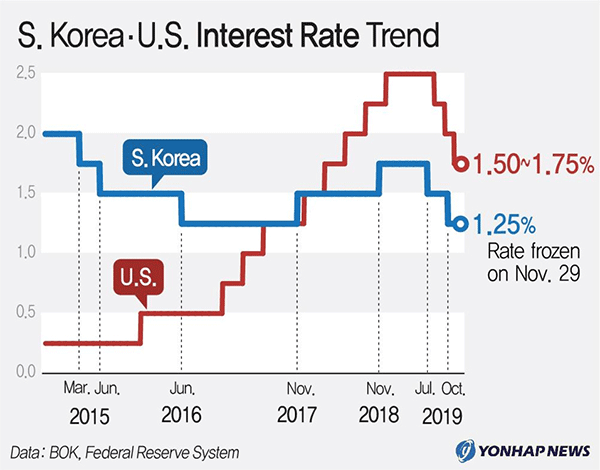South Korea's central bank will likely maintain its monetary easing next year to help support the economy and boost the country's consumer prices, with at least another rate reduction in the offing, analysts said Friday.
The Bank of Korea (BOK) slashed the policy rate twice this year -- from 1.75 percent to 1.50 percent in July and to 1.25 percent October, matching the all-time low that was previously seen in 2016.

The move came in the face of the slowest economic growth in over a decade, as well as the lowest-ever inflation in Asia's fourth-largest economy.
The economy is estimated to have grown 2 percent in 2019, the smallest figure since 2009, when it grew just 0.7 percent from a year earlier.
Analysts insist the BOK will be compelled to further slash the key rate, largely due to the country's slowing growth.
"Despite expectations for rate increases on an annual basis, we expect another rate cut in the short-run," said Kong Dong-rak, an analyst at Daishin Securities.
"An additional policy measure, such as a base rate reduction, may be inevitable for the economy to take off in earnest," he added.
Such an outlook follows 12 consecutive months of falling exports, the longest losing streak since 2016, when the country's outbound shipments saw a 19-month decline that began in January 2015.
In 2020, country's economy is estimated to expand 2.3 percent, which -- with the exception of this year -- would be the slowest on-year expansion since 2012.
The country's consumer prices are also expected to grow at the slowest pace ever seen.
The country's consumer prices are expected to have gained only 0.4 percent in 2019 from a year earlier, the lowest since the country began compiling such data in 1965.
BOK Gov. Lee Ju-yeol noted that low inflation alone may warrant rate cuts.
"The BOK plans to continue working toward bringing the growth rate in consumer prices close to the target level by maintaining the easing stance of its monetary policy," Lee said while meeting with reporters earlier this month.
The BOK too has vowed to keep its monetary policy accommodative next year, citing external risks that it said may lead to "flash" problems in the local financial market.
"There exists a possibility that the volatility in the financial and foreign exchange markets may frequently expand due to the course of external risk factors," it said in a press release, outlining the direction of its monetary policy in 2020.
"The Bank of Korea will maintain the easing stance of its monetary policy to support the recovery in growth and to ensure the rise in consumer prices will be stabilized at around the target level from a medium-term perspective," it added.
Many, however, believe the BOK may have its hands tied amid a nationwide battle to rein in the housing boom, for which the government partly blames the record low interest rates.
"Real estate prices have again been on the rise since July. This is because of abundant liquidity caused by record low interest rates, and this is what the BOK is most concerned about and is most criticized for," KTB Investment & Securities analyst Huh Jeong-in said, ruling out the possibility of a policy rate cut in the first quarter of 2020.
Others named the recent outflow of foreign investment as another reason for the central bank's monetary policy board to remain rather hawkish, at least for now.
"The number one priority of the BOK, by law, is to maintain price stabilization," a high-ranking BOK official said, speaking on condition of anonymity.
"But the second-highest priority of the BOK is to maintain financial stability," the official added.
Foreign investors have been net sellers of South Korean stocks for four consecutive months since August, dumping a net US$5.16 billion in the August-November period, according to earlier data from the BOK.
They have also net sold local bonds for two consecutive months beginning in October.
"There still exist uncertainties, but uncertainties coming from the U.S.-China trade dispute have somewhat eased since the last monetary policy board meeting in November," said Shin Dong-su, a fixed income strategist at Eugene Investment & Securities.
"A recovery in key indicators of major economies and a weakening outlook for a rate reduction by the U.S. Fed are in favor of hawkish views (at the BOK). A rate cut by the BOK may not be easy to expect, considering the limited space for policy maneuvers, unless external uncertainties re-proliferate or the recovery momentum weakens," Shin added. (Yonhap)

